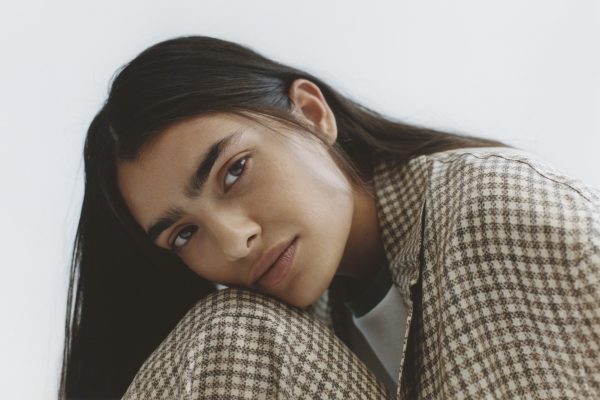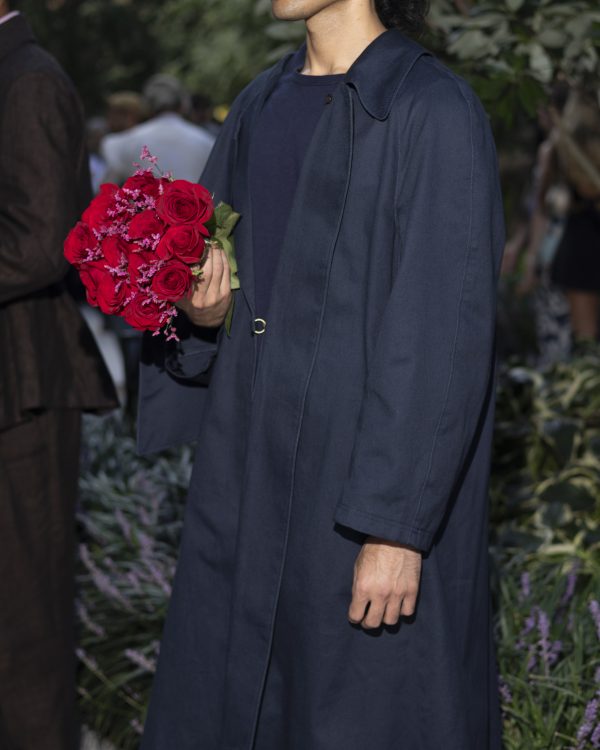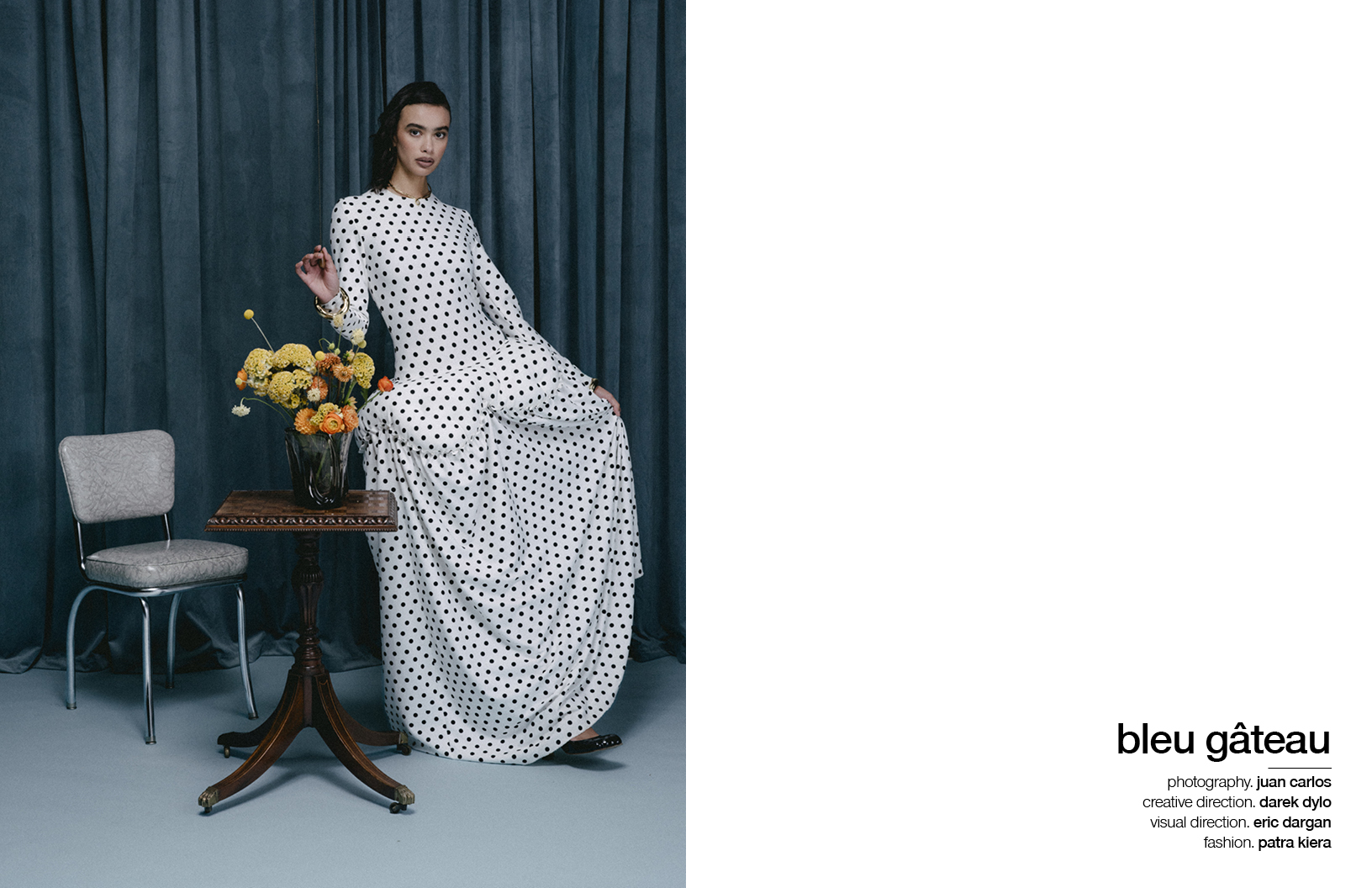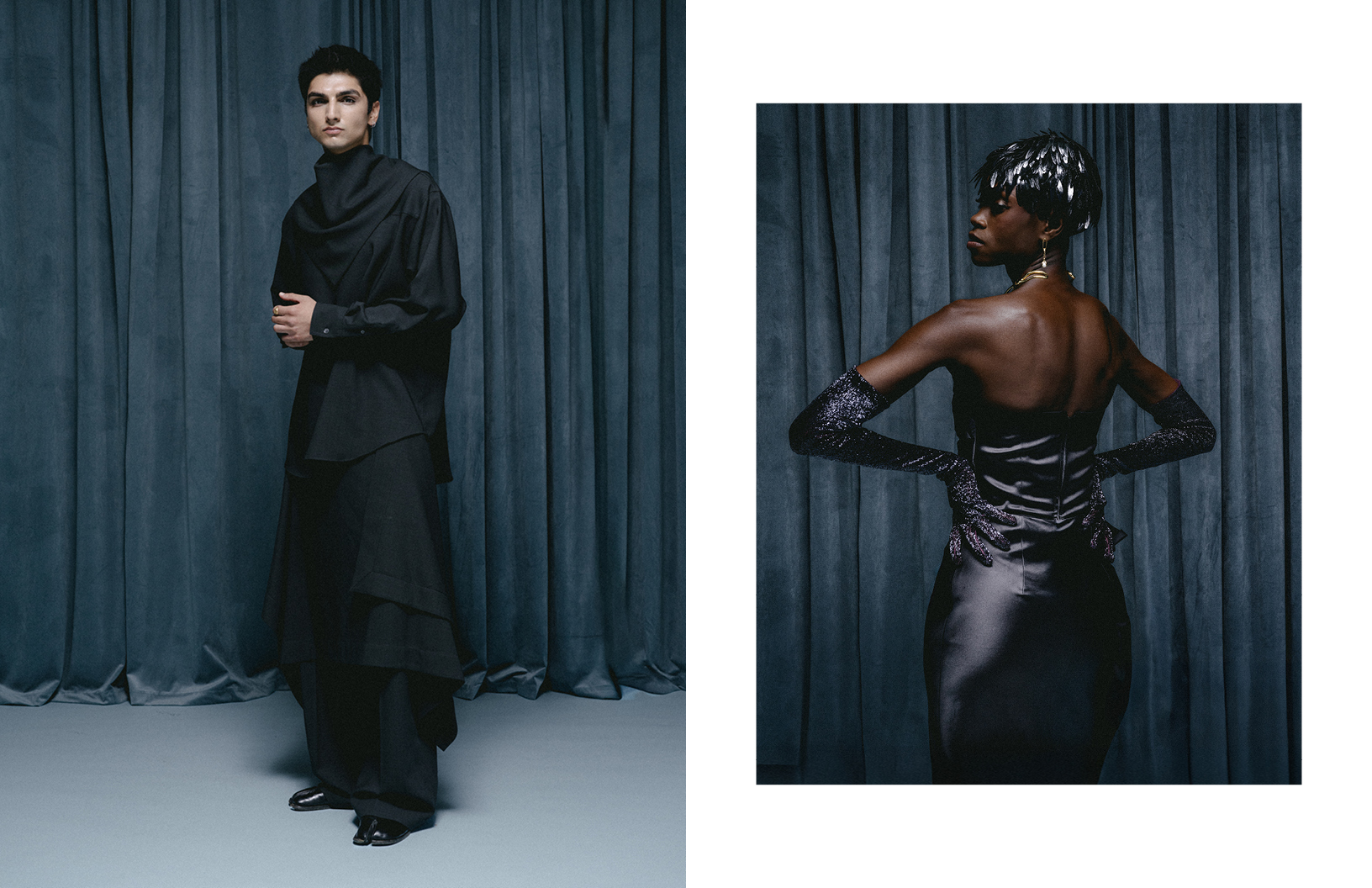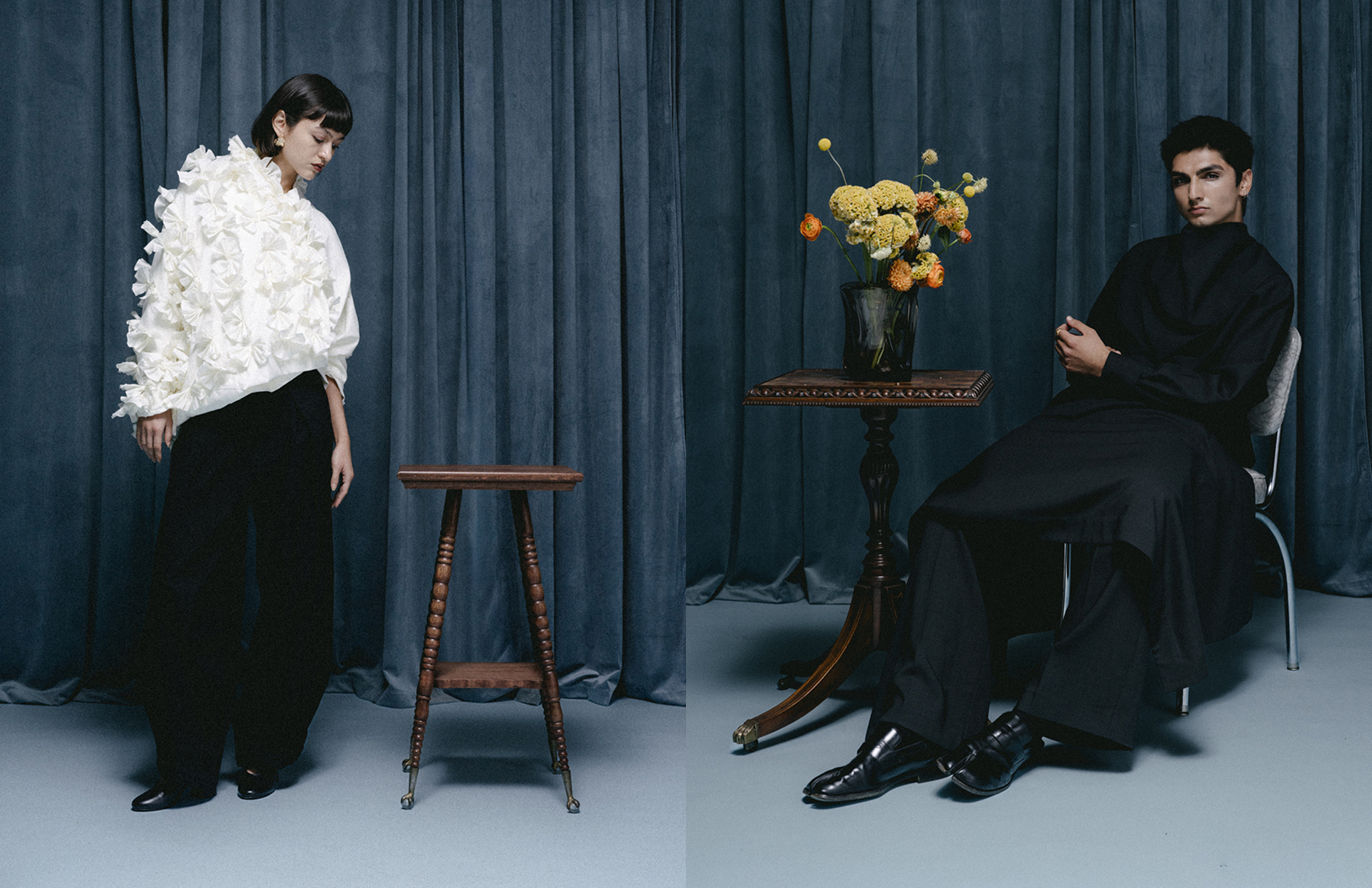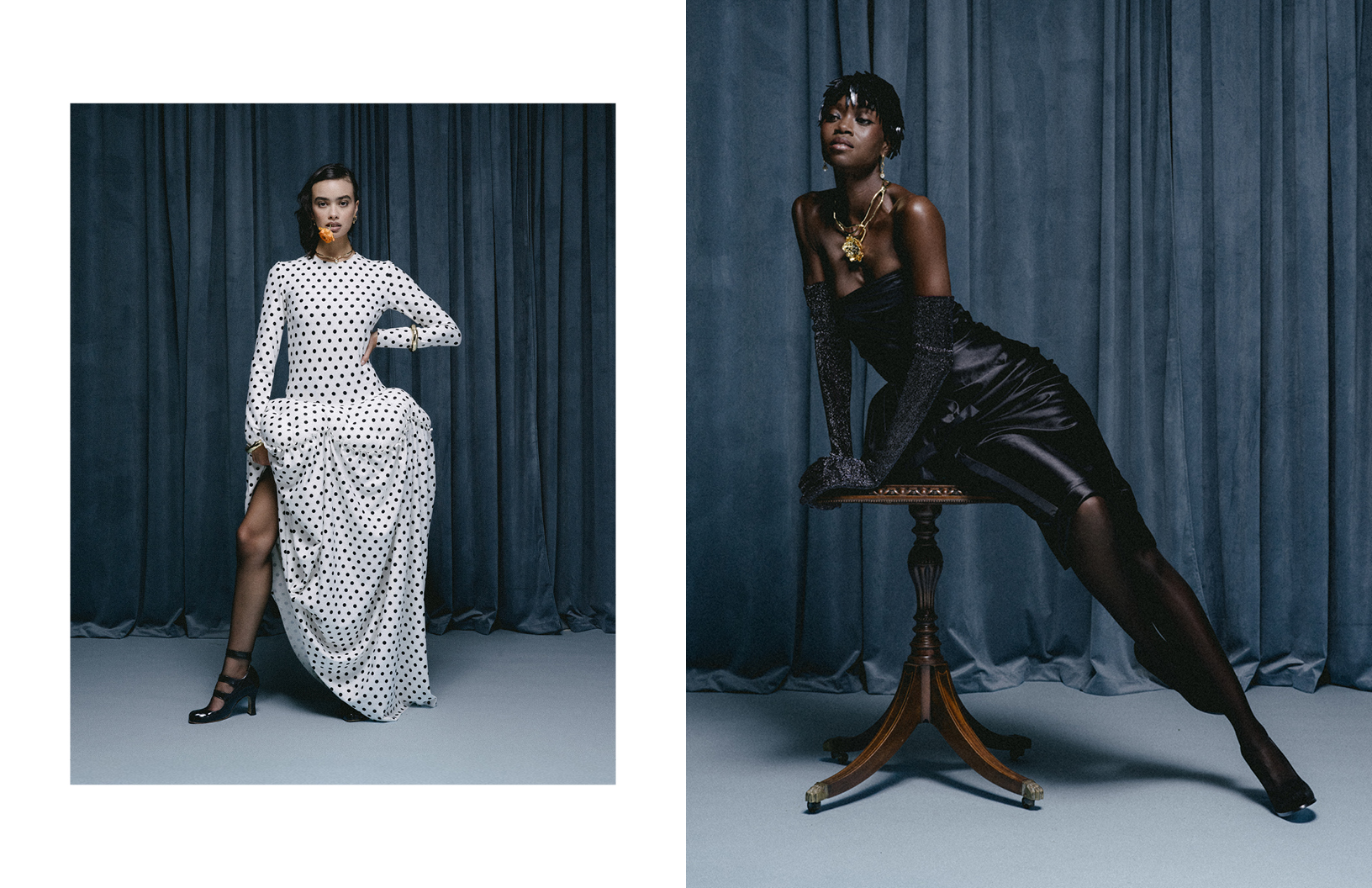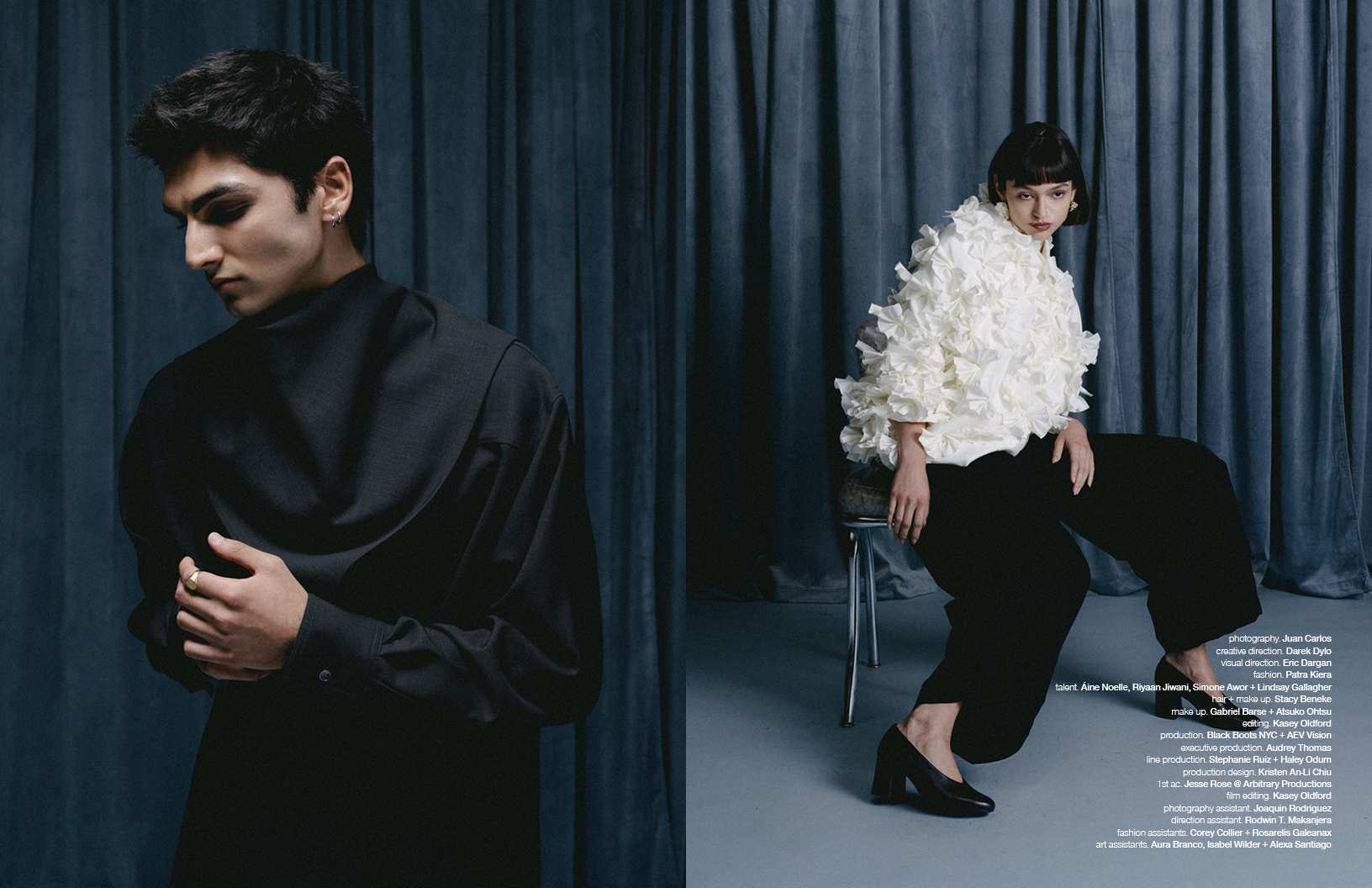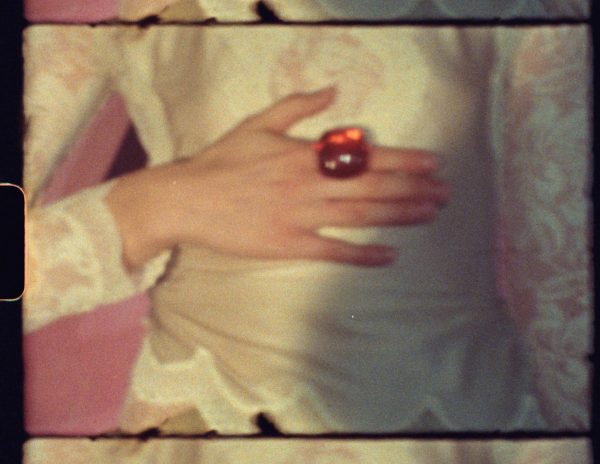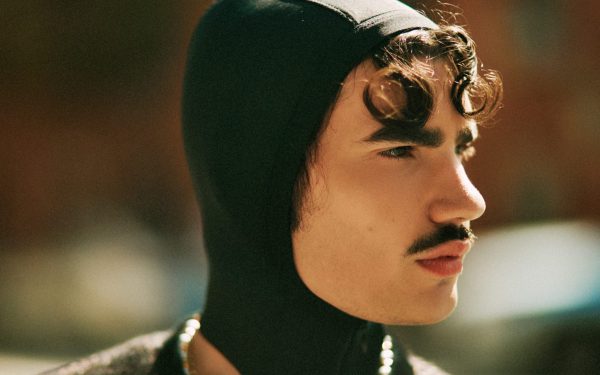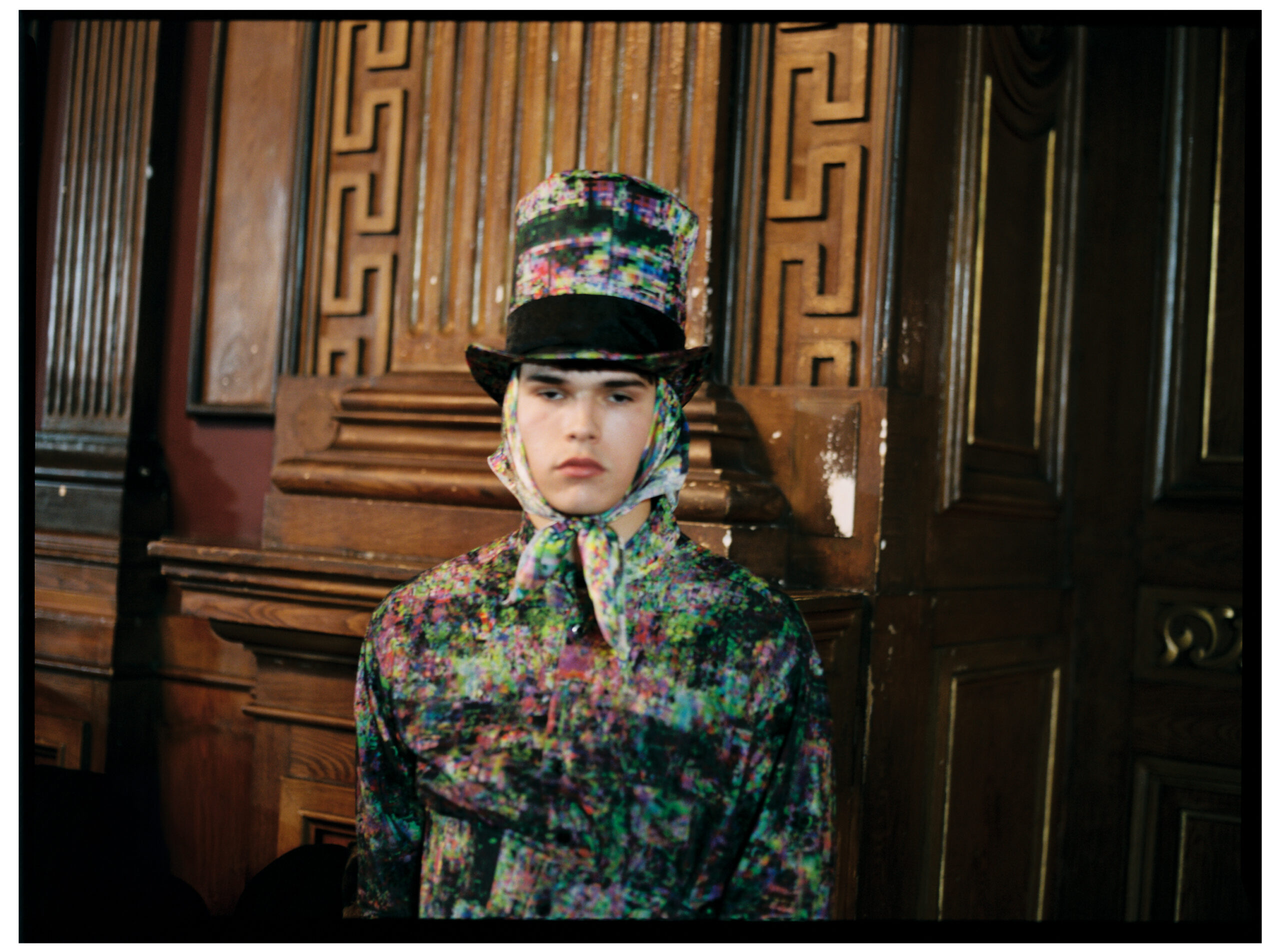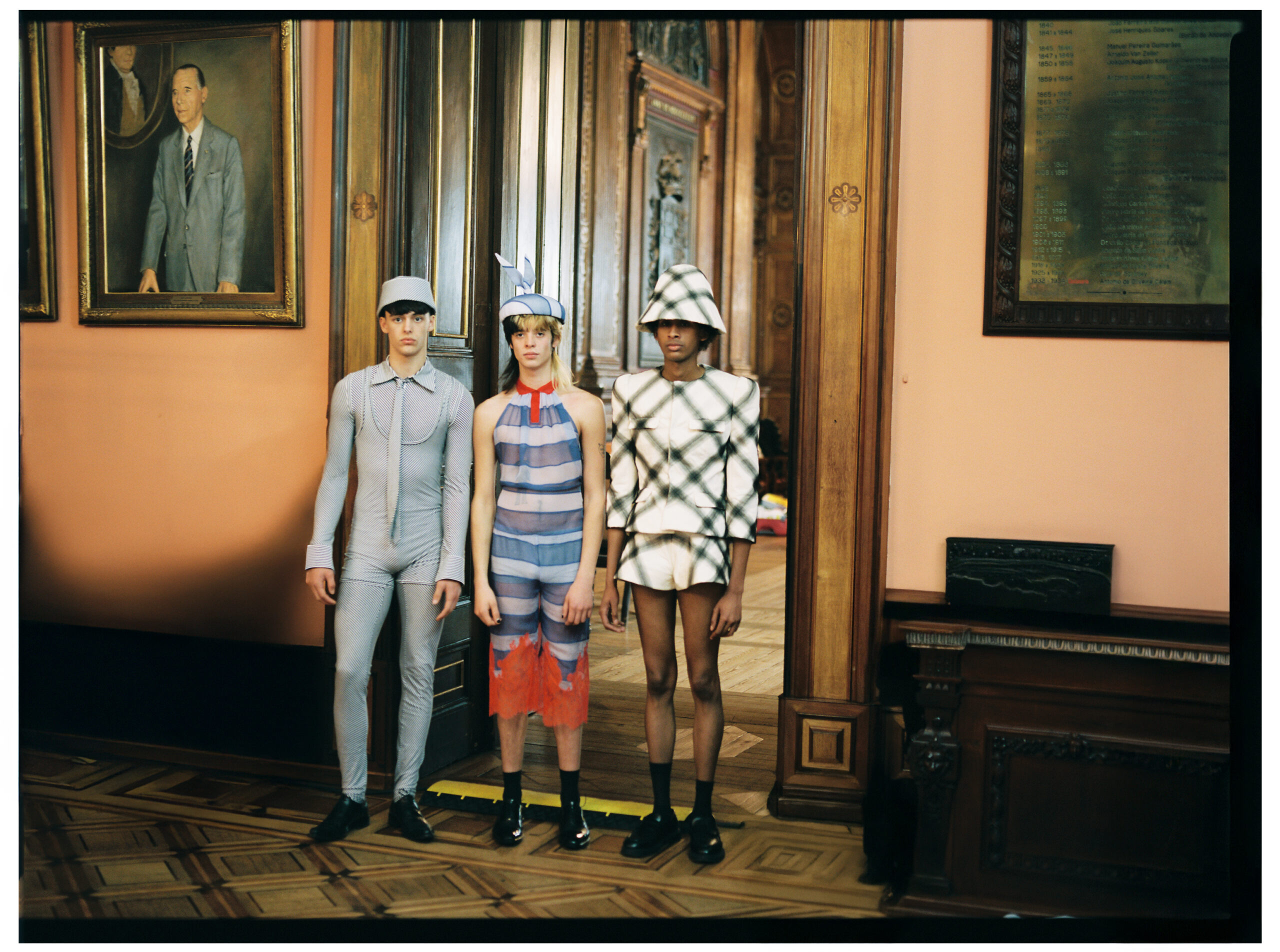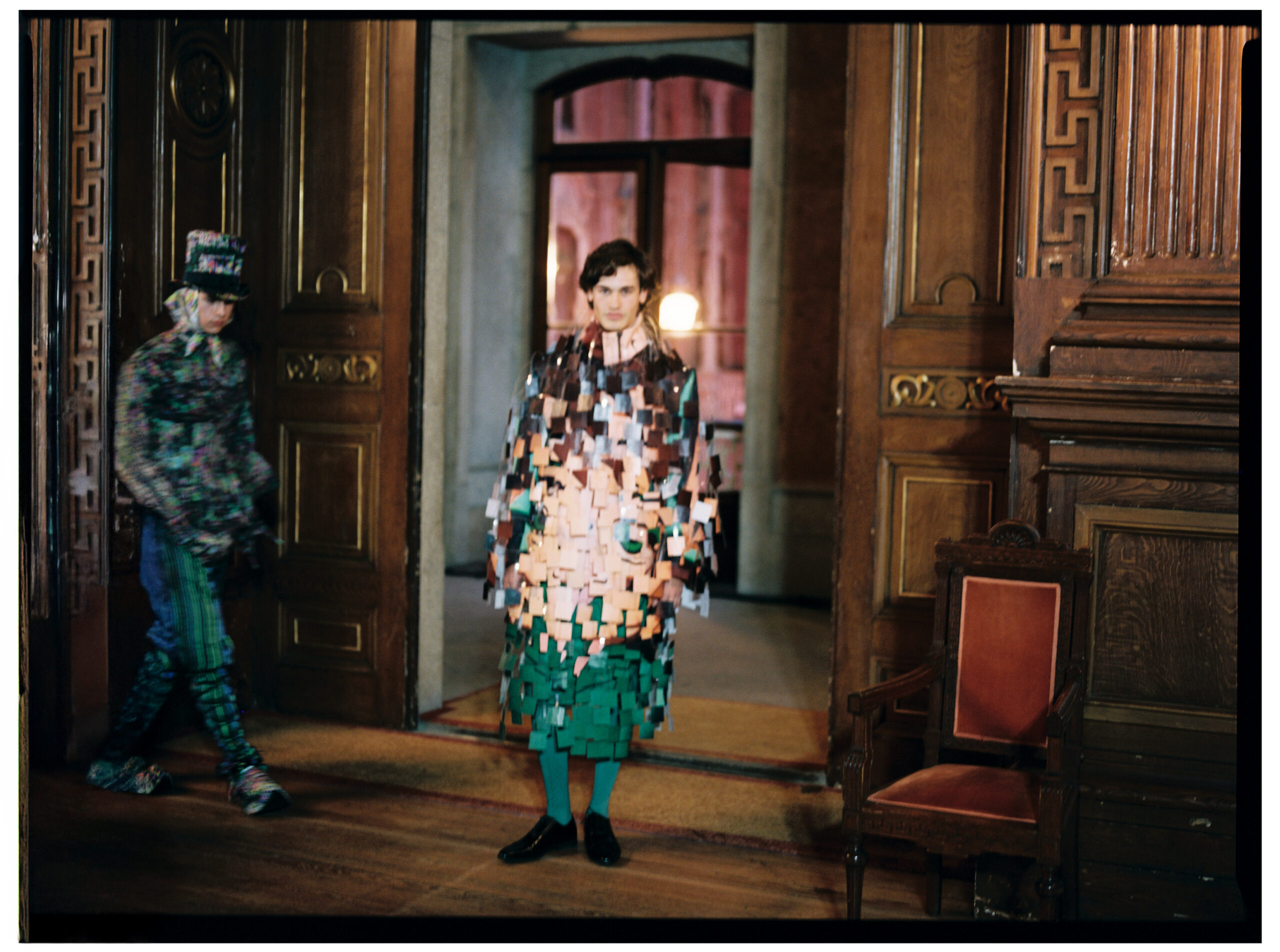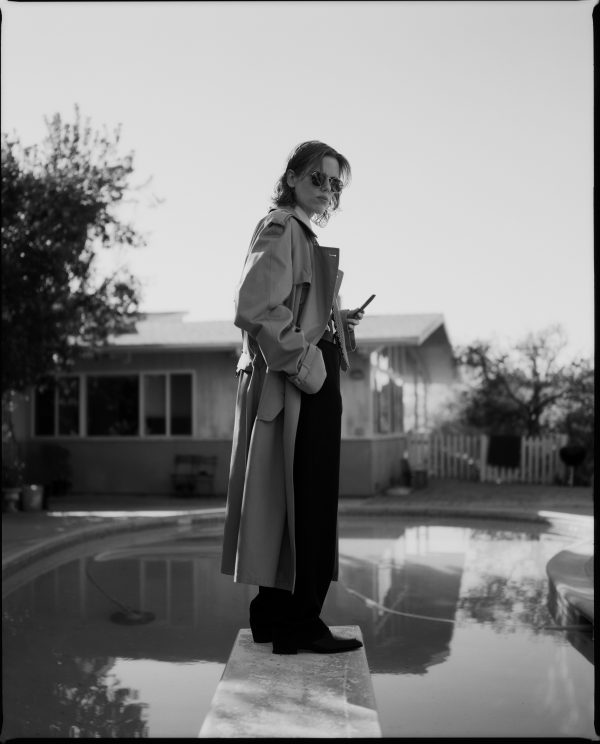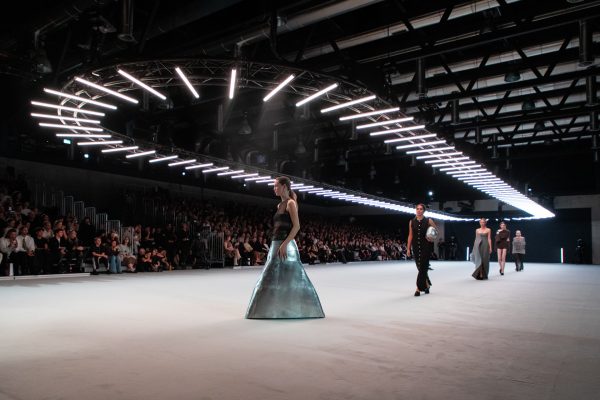
shirt. Stella Jean
trousers. King & Tuckfield
boots. Pskaufman
From a relative unknown in Uncorked, Patti Cake$, Archive 81, to the lovable and affable Wade in Pixar’s Elemental and now gracing our screens in Yorgos Lanthimos’ latest endeavour Kinds of Kindness, Mamoudou Athie is one to keep your eyes on. With an array of work covering nearly a decade, Mamodou is one of the most versatile actors in the business. Deeply thoughtful and incredibly dedicated to his craft, Athie’s steadily racking up the credits – and he’s only just beginning. A lover of stories that center on the human condition, Athie finds himself drawn to films and media that have a lesson at their core. Something that leaves the audience with a bit to chew on.
A fan of Lanthimos’ work since The Lobster, it was a no-brainer when the director’s camp reached out to him. When he read the script for the first time, he wasn’t sure whether he could make heads or tails of it, but what he did know was that it was a project he had to be a part of. Kindness of Kindness premiered at Cannes, to critical acclaim, proclaiming that Lanthimos and his eclectic, bold, and downright kooky sense of humor were back in full swing. An anthology series, the film is told through the lens of three different stories that loosely connect, for Athie, along with fellow actors Emma Stone, Willem Defoe, and Jesse Plemons to name a few, they find themselves in Lanthimos’ mind, and utterly at the mercy of it. For Mamoudou, this presented its challenges and he relished the opportunity to stretch himself to his limits.
In conversation with Schön! Athie discusses Kinds of Kindness, working with Yorgos Lanthimos, his time at the Cannes Film Festival, his favourite anime, what animation means to him, and more.
Can you take me back to the moment when Yorgos [Lanthimos] reached out to you about Kinds of Kindness? What were your first thoughts of the script? Did you have an inkling he was going to reach out?
No. Zero idea. I mean, I heard nothing about this project until it came my way. A lot of projects I’ve been extremely excited to be a part of have come my way in a similar fashion, which is just completely out of nowhere, not chased. I would have wanted to be a part of anything he does, but it wasn’t one of those things I had any idea about. My agent, Chris, called me at 11 at night, and I was like, “What’s going on?” And he said, “So Yorgos Lanthimos wants to talk to you.” And I spoke with Dixie Chassay, the casting director. Then the next day I spoke with him. I’d been such a fan of his from The Lobster. That was the first movie I’d seen of his. It was an easy, easy, easy, easy yes. And reading the script? I mean, I’m not going to tell you I understood it [laughter]. But I did see the opportunity. I did see something I was interested in, having been familiar with his work. Also understanding the extremes that existed in the script and what I had seen in his movies, I was curious how it would happen, how it would go, and what exactly we’d be exploring. Because I had a sense, that this seemed like an exploration of control. That became more apparent to me only after seeing the movie.
Amazing. I’m going into this film blind, which I like to do with Yorgos’ films. I the same for Poor Things and The Killing of a Sacred Deer. I had no idea what either of those was about. I’ve seen the trailers, and I’ve seen some TikToks of film critics saying it’s a fever dream. You also described it as such in your conversation with Variety. How should audiences prepare themselves to go into this movie?
I mean, I don’t know [laughs]. It depends on you and your constitution. It’s going to be intense. I’m not going to lie to you and say you won’t find some of it challenging, because it is. But it’s not, like, shocking for shocking’s sake. I think there’s integrity in that. You don’t feel like you’re being taken advantage of in that kind of way. This feels very purposeful and an actual exploration of humanity.
I’m looking forward to that. How would you say Kinds of Kindness has challenged you as an actor? What have you learned about yourself on this project?
I’ve always said to tolerate your discomfort. That falls into a great many situations in being an actor. I think if you’re committing to something, or committing to a character’s circumstances, sometimes that is uncomfortable. Not to mention, you’re doing it in front of all these people, and the camera’s staring at you. It’s strange. In this film, I wanted to push myself with material I haven’t worked with professionally. Though, I’ve done stuff like this in school. By “stuff like this,” I mean something that feels, I kind of want to say primal, in a way. The rest of it, well, it was kind of easy to trust Yorgos. You’ve seen his movies. He’s a gentleman. It was very easy to talk with him about things. Any concerns I might have had were easily and quickly allayed by just having a simple chat. So, it wasn’t as scary as I thought. I don’t want to spoil this movie at all for you, but you’ll see.

full outfit. Amiri
opposite
full outfit. Amiri
bow. Boy Kloves
In an interview you did with the Huffington Post back in 2022, you said you do self-check-ins with yourself after wrapping. Can you describe what that process looks like for you?
I’m curious about what I was thinking of when I said that, or what projects because it’s not like a prescribed thing that I do. I don’t like to jump from project to project for sure. It doesn’t happen very often. I like to have time to be with myself for a bit. I’m not doing some crazy method-acting thing. I take time to enjoy my own life. I think some people do it better than me. But I get a little monastic, and I don’t do much outside of reading the script or going to the gym.
How do you go from being in the headspace of your character to then wrapping the film and being yourself again? Especially after sitting with them for ‘x’ amount of weeks or months?
It depends on the project. I remember during Archive 81, I told my agents, “I don’t care who it is. I won’t be able to do anything for a while.” But then, you know, I went straight into Archive 81 after Jurassic (World: Dominion). The demands of the projects are different. I needed a mental health reset after Archive 81, which is also part of what was going on in the country at the time.
That’s totally fair. Can you talk to me about the films that inspired and comforted you growing up? You’ve stated that animation has meant so much to you in your life. What does it mean to be a part of that world with Elemental and The Boy and the Heron?
I can’t tell you how much it means to me. I’m a huge animation nerd. I devoted most of my watching TV hours, if not all, to One Piece.
Incredible! Are you caught up?
I am on the manga, but I’m behind on the anime. It’s really one of the best things in the world. I spoiled so much of it before I committed to watching however many episodes exist.
I believe it’s over a thousand now.
I just think about how deeply impactful some of those arcs and episodes were, but I knew what was going to happen. What a shame. I’m just pissed at myself. I’m sorry, what was the question? [laughs]

full outfit. Amiri
bow. Boy Kloves
The films that inspired and comforted you?
I remember being moved by Gladiator, Russell Crowe’s Gladiator. [pauses] I guess it wasn’t Russell Crowe’s, I guess it was Ridley Scott’s. Let me think. I want to get this exactly right because some of these movies are so formative. A lot of Denzel’s work had a lasting impact. It’s hard to nail it down to one thing. Animation had a huge impact, especially Japanese anime. I love Star Wars. I was a huge nerd for it. When I first discovered Cowboy Bebop, I was like, “This is something else.” That whole run Adult Swim had and Toonami, because that was my first foray into all of this. It really changed the way I saw what was possible in animation. The gorgeous stories that can only be told as fully as, you know, technology allows now in animation. I was so obsessed with some of those shows and then (Hayao) Miyazaki’s work. Getting to do even a bit part in that movie was just a dream. I mean, it’s gorgeous, genuinely gorgeous.
That sort of leads me to my next question, what is it about animation, in your opinion, that sets itself apart as a medium for stories to be told?
It’s a blank page for creators’ dreams. You’re somewhat confined by reality in cinema, which presents a kind of challenge that’s exciting in a different way. But I’ve had the same emotional connection to animation as I’ve had to film sometimes, depending on the project. You can do whatever you can conceive of on the page. And that kind of freedom is wonderful, especially when it’s handcrafted. The stuff that’s taken time to make, not just some manufactured thing or cobbled together by other people’s work. I’m talking about AI here. There’s a huge difference. I think these things are intangible, they’re felt by the audience and the people watching it.
I often see these Miyazaki and Dragon Ball Z mashups, or what would it look like if Miyazaki did it, which is interesting at face value, but that doesn’t exist unless Miyazaki made it or Toriyama made it. This is coming from people’s imaginations. And those are the things people connect to, not just find interesting. This is where I think people should continually invest in the arts because even if something doesn’t necessarily work, something is going to work eventually. And I know it’s a business and you have to make money, but you never know how it affects the next person, or how it inspires another artist to make something great, even if it doesn’t make a ton of money.
Turning back to Kinds of Kindness, the film premiered at Cannes. Can you walk me through what that experience was like and how you coped with the audience’s reactions?
I was curious, so I couldn’t wait to talk to people afterward. The way people responded to the movie was great. I have such respect for the cast and director and producers, like Ed Guiney and everyone else and Searchlight, because they make real movies. They do. Or they support them, you know. It was nice to be there in that capacity with people I’ve respected for a long time and share the stage with them in that way. It was exciting. It was cool. We had a pretty good time. The after-party was fun.
I’m sure it was. Was that your first time there?
No, that’s my second. I was there for Elemental, which was great. I was supposed to have been there for Patti Cake$, but I wasn’t a citizen of the States, and I didn’t have my passport together. But it was awesome, and we had a really, really great time.

coat. King Kennedy
trousers. KRONE
opposite
jacket + shirt. CLUTCHGOLF
hat. Gladys Tamez Millinery
When you’re reading through a script, what are you looking for? Is it a commonality between yourself and the characters, or is it something else that draws you in?
It depends. I’m playing a real sociopath right now. It’s terrifying. The guy is a bad guy. I get annoyed when actors are like, “Oh, you can’t judge a character.” [laughs] Yes, you can. I judge myself. What are you talking about? People are people, and I can do the thing without justifying his shitty behaviour. Anyway, it annoys me when I hear actors say that, because I’m like, you’re being disingenuous. In any case, it depends. There are a lot of things I never would have thought I’d have done, Kinds of Kindness being one of them, or Patty Cakes, or things that didn’t occur to me. Most of my career is based on projects that didn’t occur to me. But if there’s a story that I’m interested in telling, or a filmmaker Yorgos that I just have to work with, I go for it.
It’s the story itself. I think about Uncorked all the time because it really changed my life. It’s part of how I got Elemental because Pete Sohn saw that. It led to a couple of other things. All that to say, it’s the people, and it’s the story. I’ve said this in a couple of interviews lately, but I was in a play and I was stopped once outside after it. I don’t remember what the lady looked like, but I remember the feeling with which she was talking about. This play was about people, money, and avarice, and what people would do when they’re desperate. It just felt important and useful, and I felt really privileged to have affected somebody in that way because that’s how it made me feel. I was like “Oh, this is a story that I have to do,” and I couldn’t stop thinking about it, because it just felt so imminently useful. It felt like we were doing something.
Is there a piece of media that has affected you like that, in the same way?
One Piece was an antidepressant. It’s amazing. But when I think about a book, I think about Les Misérables. I read it when I was in high school, and I was just so moved by Jean Valjean’s goodness and humanity. It was deeply affecting stuff. Speaking of tender. Jenny Holzer. My teacher, Ron Van Loon, in my final year at grad school, directed a play called In Arabia, We Would All Be Kings by one of the best playwrights living, Stephen Adly-Girgis. And on the front of the program, it had her artwork and a quote that said, “It is in your self-interest to find a way to be very tender.” I was obsessed with that image. Up until this character that I’m playing currently, because this guy is empty, outside of rage and avarice. He’s just this really charming sociopath. Up until playing this guy, that has been the backbone for every character that I’ve played. When I think of the most interesting kind of performance, I think of Sally Hawkins in, well, in anything really. But particularly in The Shape of Water, where she’s not trying to show off. I see somebody sharing their soul in a way you can’t imitate or fake. I find that deeply, deeply moving. Same thing, when I think about Joaquin Phoenix and Denzel [Washington]. I think that’s what real acting is. And it comes with a price. It’s not easy to do that. You’re opening yourself up to be very sensitive not just in that moment.
You open yourself up to being vulnerable, which is, it’s not an easy thing to do. It takes a lot of courage. And lastly, what words of advice would you give your younger self at the beginning of your acting career, knowing all the things you do now?
It’s interesting, I’ve learned so many lessons from my mistakes, that I’m kind of grateful for them in a weird way. There was a moment I had, I remember I didn’t get a couple of jobs I thought I was right for and I was confused. I went to visit a friend in Colombia. And I was melancholy about the whole thing. And I was sitting on a hammock, at 12 o’clock in the middle of December on a Thursday, and I was thinking, “Man, sucks.” And then I looked at where I had the ability to be at the drop of a hat. And I was like, “If I continue to think like this, I will never be happy.” But I started to think, if I can just get into Yale, and then if I just get this off-Broadway show, and if I can get this TV show, and then a bigger part in a movie, then if I can get these leads, it’s a never-ending cycle unless you find real contentment with the work that you’re doing and yourself. So, I would give myself that lesson a little earlier, but everything in its due time. I’m grateful.

shirt. Stella Jean
trousers. King & Tuckfield
Kinds of Kindness is out now.
direction + photography. Zach Larraz
fashion. Branden Ruiz
talent. Mamoudou Athie
grooming. Grace Phillips @ TMG using Dior Beauty
videography. Alec Rodriques
fashion assistant. Ariel Arechiga
interview. Dana Reboe


















